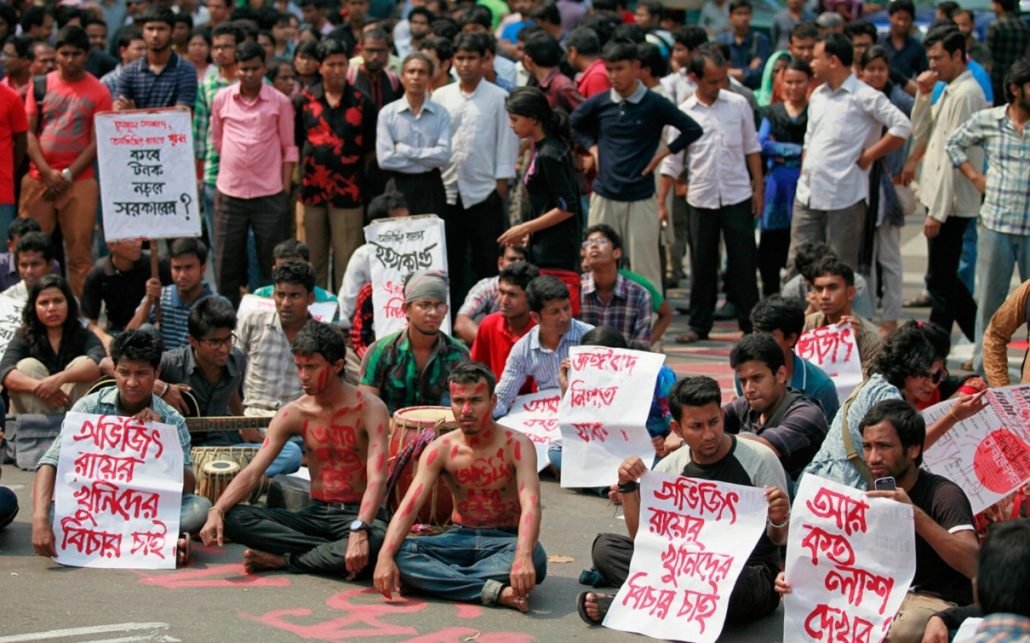For a country founded after an 8-month war, which led to the death about 3 million people, one would expect that the Bangladeshi people would learn from their mistakes. That is, they would eventually change their stance on internal disputes. However, the reality is different. Political and religious violence in the country continued to the present. 45 years after the deadly war, Bangladesh does not resemble a progressive state. Being a country that suffered because of religious extremism in the past, even nowadays, with a so-called liberal government and a secular constitution, Bangladesh is going through another major violent war. This time, a war on its own people.
As a country with an 89% Muslim population, the Bangladeshi people and government have little to be proud of regarding acceptance and toleration of people of other religious viewpoints. The secular society of Bangladesh has always existed, but always acted in the background because of fears of persecution. In 2001, Avijit Roy, an activist and blogger decided to take the next step forward and create the first freethinking community in Bangladesh. A blog named Mukto-Mona (translated as Freethinkers in Bengali), which advocated for free expression, gender equality, skepticism, humanism, and human rights.
Mukto-Mona was growing in the first decade of the 21st century, gaining popularity, and managing to raise the voice of the atheists and humanists of Bangladesh. Such was the impact that it started to have on society that, eventually, it seemed that the only way to tackle it was violence. Since 2013, the number of murders of people who were critical to Islam had increased. Amongst them, Avijit Roy’s murder in 2015. Atheists, secularists, humanists, homosexuals, and human rights activists, mostly bloggers, were some of the victims of the Islamist extremists who over the course of three years have hacked their victims (more than 50) to death by attacking them with machetes. Most of them on plain sight. The reason being they offended the Muslim population with their articles and at the same time they were blasphemous towards Islam.

Surprisingly, and in a shameful manner for the Bangladeshi government, the Islamist extremists have a legal ground, also often used by the government to trial and imprison the bloggers. In fact, Section 57 of the Information and Communications Act, a remnant of old British colonial law, heavily criticised numerous times by Amnesty International, criminalises blasphemy and allows an up to 2-year imprisonment for insulting religion.
However, blasphemy being a vague term, it is not explained in the Act on which occasions an act is blasphemous or not, leaving it entirely upon the government to decide, essentially creating a theocratic state, which neither respects human rights nor supports equality within the state of Bangladesh.
What is more, the Awani League, the ruling party, ordered bloggers of the Mukto-Mona movement to shut down their blogs because of a violation of Section 57 of the ICT Act. In point of fact, the police warned the bloggers to “not cross limits or offend people’s religious sentiments.” Both the government and the police fail miserably to provide justice after a murder is committed, which is in spite of protests by thousands of people and pressure by the international community. Recently, in June 2016, about 100,000 Bangladeshi Muslim clerics issued a fatwa (a ruling of Islamic law) condemning the attacks on non-Muslims, minorities, and secular activists and arguing that the attacks do not represent the true teachings of Islam. Despite that, the government remains silent and continues to imprison secular activists while refusing to investigate the murders of atheist bloggers.
Bangladesh, unfortunately, is an example of many, in an era often characterised as Islam’s Middle Ages, where religion acts as a barrier to nations, and individuals, and does not allow them to develop, flourish, and prosper. There is great potential in the world’s communities, which is wasted on strict religious laws imposed by the governments themselves that insist on the continuance of avoiding a secular state and violating basic human rights.
Activists are being attacked, imprisoned, or executed for their views. However, despite the inhumanity from all the hatred and heartbreaking violence, maybe we can but hope that maybe, on the horizon, a cultural reformation in Islam will take place. Maybe Islam’s Middle Ages will be followed by a new Renaissance. This is the fuel that motivates those brave bloggers in Bangladesh, and indeed Muslim reformers the world-over.
Spreading the news about the atrocities that take place in Bangladesh and other non-secular states is what one can do to raise awareness, to bring about that new cultural reformation, to bring about questioning within the religion, to align itself with the secular values of new. In fact, this is exactly what the Mukto-Mona bloggers have achieved by using the power of the internet to spread the word. The ground has been set by all those who keep fighting for secularism and humanist values. We just need to keep building.






Article Discussion